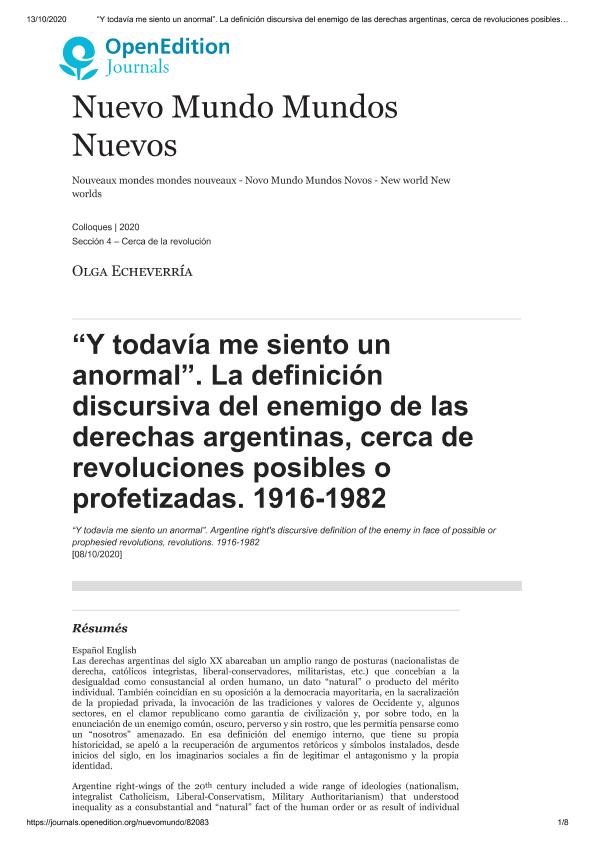Mostrar el registro sencillo del ítem
dc.contributor.author
Echeverria, Olga Ines

dc.date.available
2020-10-28T00:04:44Z
dc.date.issued
2020-10
dc.identifier.citation
Echeverria, Olga Ines; "Y todavía me siento un anormal": La definición discursiva del enemigo de las derechas argentinas, cerca de revoluciones posibles o profetizadas: 1916-1982; École des Hautes Études en Sciences Sociales. Centre de Recherches sur les Mondes Américains; Nuevo Mundo Mundos Nuevos; 10-2020; 1-8
dc.identifier.uri
http://hdl.handle.net/11336/117001
dc.description.abstract
Las derechas argentinas del siglo XX abarcaban un amplio rango de posturas (nacionalistas de derecha, católicos integristas, liberal-conservadores, militaristas, etc.) que concebían a la desigualdad como consustancial al orden humano, un dato “natural” o producto del mérito individual. También coincidían en su oposición a la democracia mayoritaria, en la sacralización de la propiedad privada, la invocación de las tradiciones y valores de Occidente y, algunos sectores, en el clamor republicano como garantía de civilización y, por sobre todo, en la enunciación de un enemigo común, oscuro, perverso y sin rostro, que les permitía pensarse como un “nosotros” amenazado. En esa definición del enemigo interno, que tiene su propia historicidad, se apeló a la recuperación de argumentos retóricos y símbolos instalados, desde inicios del siglo, en los imaginarios sociales a fin de legitimar el antagonismo y la propia identidad.
dc.description.abstract
Argentine right-wings of the 20th century included a wide range of ideologies (nationalism, integralist Catholicism, Liberal-Conservatism, Military Authoritarianism) that understood inequality as a consubstantial and “natural” fact of the human order or as result of individual skills. They also coincided in the opposition to majoritarian democracy, in the sacralization of private property, the call to defend Western traditions and values, in some cases, the Republic as a shelter of the Civilization, and over all, the denouncement of a common, dark, pervert, and face-less enemy that allowed to the right-wings to identify themselves as a threatened “we”. That definition of internal enemy, with its own historical variations, recovered rhetorical ideas and symbols available in the collective imaginaries from the beginning of the 20th century in order to legitimate antagonism and the self-perception.
dc.format
application/pdf
dc.language.iso
spa
dc.publisher
École des Hautes Études en Sciences Sociales. Centre de Recherches sur les Mondes Américains
dc.rights
info:eu-repo/semantics/openAccess
dc.rights.uri
https://creativecommons.org/licenses/by-nc-nd/2.5/ar/
dc.subject
DERECHA
dc.subject
ARGENTINA
dc.subject
SIGLO XX
dc.subject
ENEMIGO
dc.subject
REVOLUCIÓN
dc.subject.classification
Otras Historia y Arqueología

dc.subject.classification
Historia y Arqueología

dc.subject.classification
HUMANIDADES

dc.title
"Y todavía me siento un anormal": La definición discursiva del enemigo de las derechas argentinas, cerca de revoluciones posibles o profetizadas: 1916-1982
dc.title
“Y todavía me siento un anormal”: Argentine right's discursive definition of the enemy in face of possible or prophesied revolutions, revolutions: 1916-1982
dc.type
info:eu-repo/semantics/article
dc.type
info:ar-repo/semantics/artículo
dc.type
info:eu-repo/semantics/publishedVersion
dc.date.updated
2020-10-27T17:45:17Z
dc.identifier.eissn
1626-0252
dc.journal.pagination
1-8
dc.journal.pais
Francia

dc.journal.ciudad
París
dc.description.fil
Fil: Echeverria, Olga Ines. Consejo Nacional de Investigaciones Científicas y Técnicas. Centro Científico Tecnológico Conicet - Tandil. Instituto de Geografía, Historia y Ciencias Sociales. Universidad Nacional del Centro de la Provincia de Buenos Aires. Instituto de Geografía, Historia y Ciencias Sociales; Argentina
dc.journal.title
Nuevo Mundo Mundos Nuevos
dc.relation.alternativeid
info:eu-repo/semantics/altIdentifier/url/https://journals.openedition.org/nuevomundo/82083
dc.relation.alternativeid
info:eu-repo/semantics/altIdentifier/doi/http://dx.doi.org/10.4000/nuevomundo.82083
Archivos asociados
